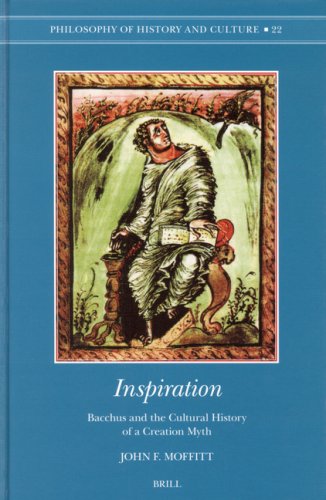(Ebook) Inspiration: Bacchus and the Cultural History of a Creation Myth by John F. Moffitt ISBN 9789004142794, 9004142797
Review by Jack M. Greenstein (University of California - San Diego), as published in Renaissance Quarterly, LVIII/4, Winter 2005, pp. 1388-9: "The thesis of John Moffitt's book is simple: the modern idea of art as creative self-expression is but a new twist on an age-old myth of inspiration -- in particular, of the Bacchic sort. [ . . .] The first part [is] a case study on the cultural context for Michelangelo's Bacchus (1496); the second, which takes an occultist turn familiar from his books on Marcel Duchamp and Joseph Beuys, [deals with] inspiration in Modernist art, from the automatism of the Symbolists to the action painting of Jackson Pollock and the shamanist practices of Beuys and other performance artists. "Although most of the sources cited in part 1 are familiar to readers of this journal [the Renaissance Quarterly], they have not been brought together in this way before. In the Phaedrus, Plato ascribes four kinds of `madness' to possession by the gods: the inspiration of mystics to Dionysius, of prophets to Apollo, of poets to the Muses, and, the highest form, of lovers to Aphrodite. Horace merges these four types in the persona of a divinely inspired poet, victimized by `amiable madness' and transported by wine. Callisiratus extends `the gift of a more divine inspiration' to the hands of sculptors in an ekphrasis of a Bacchante by Skopas (p. 72). Christian thinkers unsurprisingly ascribe inspiration and rapture to possession by their God, a state illustrated for Moffitt by the St. Luke author portrait in the Ebbo Gospels. This interpretation becomes so ingrained that, in the `Moralized Ovid' (1342) by Petrus Berchorius, Bacchus is `True Faith,' and even Christ (pp. 123-24). All these sources and more, according to Moffitt, describe the same psychological syndrome, an ecstatic stare which modern science attributes to a chemical imbalance of endorphins. "Florentine humanists restore Bacchus to his pagan glory as `Noble Intoxication' and `'Father Freedom' (Pater Liber). `Through the daily employment of [wine],' argues Marsilio Ficino, `the spirit finally becomes Apollonian and liberated' (p. 136). Bacchic ecstasy (that is, wine) initiates philosophers and theologians into divine mysteries, the realm of Platonic Ideas and the Trinity. This, then, is the context for Michelangelo's Bacchus, which was produced -- Moffitt's best point -- in mimetic competition with Praxiteles' lost Dionysius as described by Pliny and Callistratus. "With Immanuel Kant, inspiration is associated with `genius' and located in the individual psyche, rather than ascribed to an external god. To tap this internal source, the Symbolists adopt `automatism' and other psychosomatic techniques, which according to Moffitt bear some resemblance to occultist practices (although the occultists claim to be tapping external sources or power). When, in the late twentieth century, art becomes the object of worship and rock music popularizes Bacchic frenzy, impressionable young people are misled into thinking that they too can be artists, with the result that there is now a glut of BFA and MFA graduates. [ . . . ] The book [is also] useful as a collection of [primary] sources."
*Free conversion of into popular formats such as PDF, DOCX, DOC, AZW, EPUB, and MOBI after payment.


